iPhone 12 vs. Galaxy S21: Which $799 powerhouse is the best?
Can the Galaxy S21 take down the reigning champ, the iPhone 12
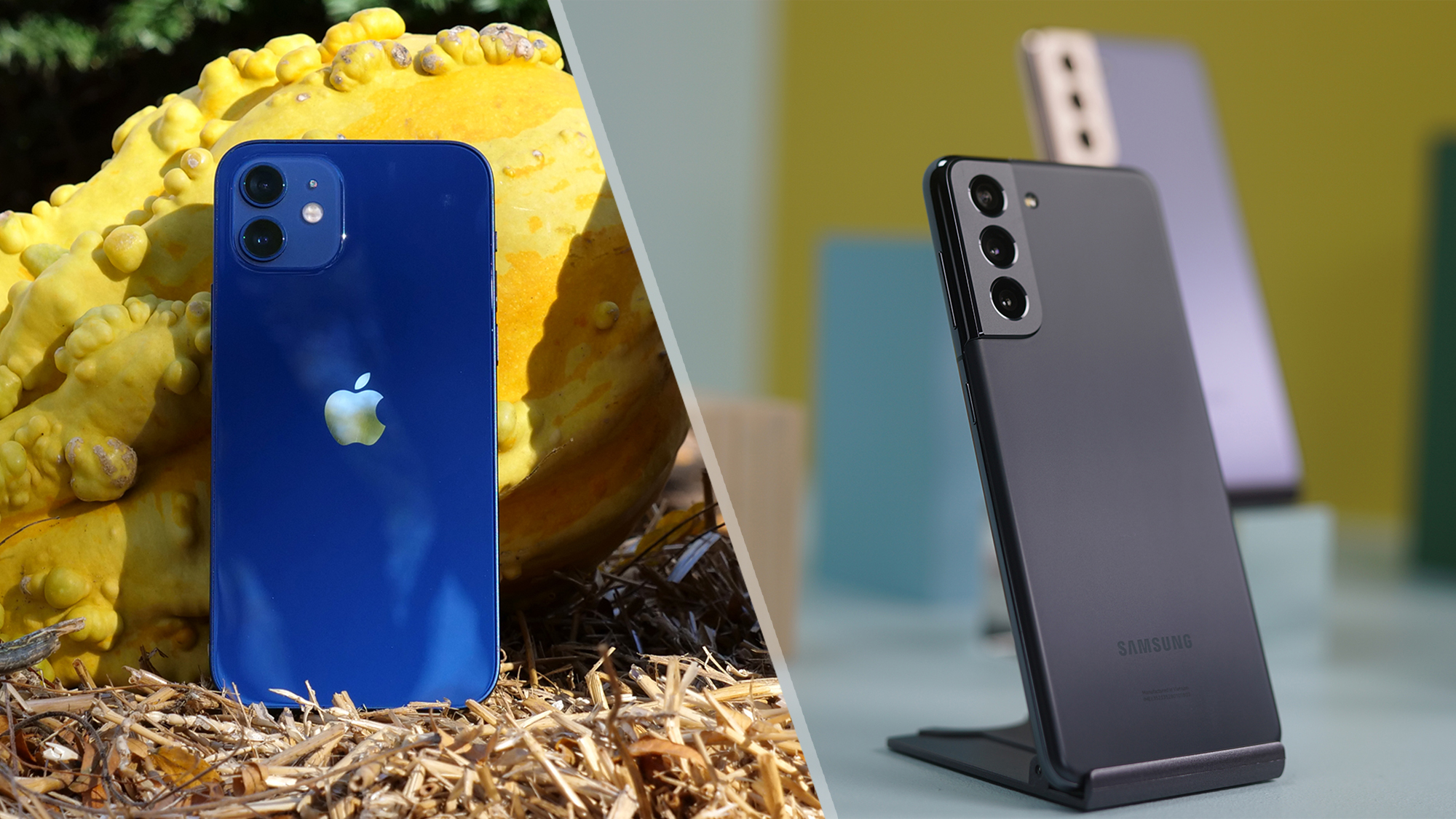
Sign up to receive The Snapshot, a free special dispatch from Laptop Mag, in your inbox.
You are now subscribed
Your newsletter sign-up was successful
While the iPhone 12 currently sits atop our recommendations for the best smartphone of 2021, Samsung's newly announced Galaxy S21 is ready for its shot at the title.
Samsung dropped the price of its Galaxy S line this year, bringing the Galaxy S21 back down to a $799 starting price, which is identical to the standard iPhone 12. That was a crucial move for Samsung as the significant price gap last year was a lot to overcome when you consider the many feature advantages the iPhone 11 had over the Galaxy S20.
- Samsung Galaxy Buds Pro review
- iPhone 12 Pro Max vs. Galaxy Note 20 Ultra: Premium flagship fight!
- Samsung Galaxy S21 pre-order deal: Save up to $700 with eligible trade-in
Once we finish our full review of the Galaxy S21, we will update this comparison with those findings. But for now, here's a look at the iPhone 12 versus the Galaxy S21 across seven crucial categories.
| Row 0 - Cell 0 | iPhone 12 | Galaxy S21 |
| Display | 6.1-inch Super Retina OLED (2,532x1170) | 6.2-inch Super AMOLED FHD+ Adaptive 120Hz |
| CPU | Apple A14 Bionic | Qualcomm Snapdragon 888 |
| RAM | 4GB | 8GB |
| Storage | Starts at 64GB | Starts at 128GB |
| Rear cameras | 12MP wide (ƒ/1.6); 12MP ultrawide (ƒ/2.4) | 12.2MP f/1.8 (Wide-angle), 12MP f/2.2 (Ultra-wide), 64MP f/2.0 (Telephoto) |
| Front camera | 12MP (f/2.2) | 10MP f/2.2 (Wide-angle) |
| Battery size | 2,851 mAh | 4,000 mAh |
| Water resistance | Yes, IP68 | Yes, IP68 |
| Colors | White, Black, Blue, Green and (PRODUCT) RED | Phantom Grey, Phantom White, Phantom Violet and Phantom Pink |
| Dimensions | 5.78 x 2.81 x 0.29 inches | 6 x 2.8 x 0.31 inches |
| Weight | 5.8 ounces | 6.03 ounces |
iPhone 12 vs. Galaxy S21: price and value
The iPhone 12 starts at $799 for a 64GB model with 4GB of RAM. You can double your storage to 128GB for another $50, or for $949, you can buy the maxed-out 256GB model we reviewed.
The Galaxy S21 also starts at $799, but the base model includes 128GB of storage with 8GB of RAM. You can bump that up to 256GB for just $849.
Despite the matching price point, the Galaxy S21 wins this round based on value. Not only does it offer double the storage in the base model, but the top of the line 256GB option is $100 cheaper than the comparable iPhone 12.
Winner: Galaxy S21
Sign up to receive The Snapshot, a free special dispatch from Laptop Mag, in your inbox.
iPhone 12 vs. Galaxy S21: design
If you read our iPhone 12 review, or any of our reviews of the iPhone 12 models, you'll see that we're fans of Apple's throwback redesign. It makes the device stand out from the sea of slabs and remains a comfortable form factor in daily use.
The iPhone 12 didn't just get upgraded aesthetics either, but a boost to its durability as well. The new ceramic shield display offers four times greater protection against drops and its IP68 resistance against dust and water also improved, allowing it to withstand 30 minutes submerged at up to 20 feet.
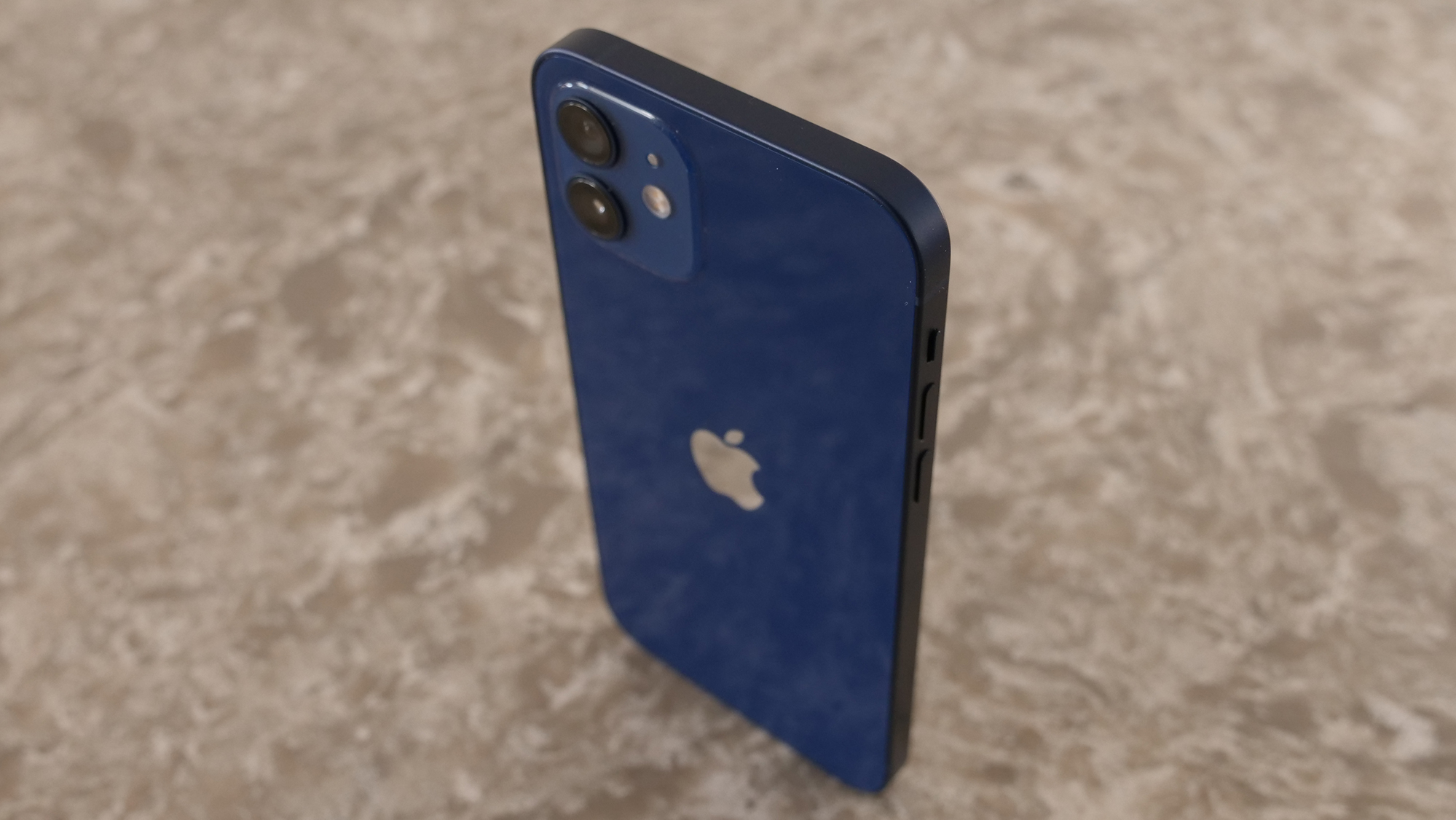
While Samsung gave the hard sell that the Galaxy S21 is a significant redesign, that's overselling it a bit. The rear camera array that now features Samsung's "Contour Cut Camera housing" does give the back of the phone a dramatically different look, rolling off smoothly into the top and side of the phone. Whether it makes an objective difference in terms of usability and comfort will have to await my full review.
From a durability standpoint, Samsung moved to a plastic back rather than the glass of the Galaxy S20. And while it may not feel as premium, it should handle the occasional drop better. Water and dust resistance remains static at IP68, able to withstand submersion in about five feet of water for 20 minutes.
The Galaxy S21 is the larger of the two devices at 6 x 2.8 x 0.31 inches versus 5.8 x 2.8 x 0.3 inches, but it's by the slimmest of margins and will feel smaller thanks to its more rounded design. Weight similarly tips slightly in the iPhone's favor at 5.8 ounces compared to 6, but you won't perceive that difference.
My subjective opinion of the designs comes down on the side of the iPhone 12. I just like the look and feel of the squared-off design, but the Galaxy S21 is an improvement over the S20. Factoring in comfort and usability, the Galaxy S21 will have at least a slight edge with its rounded edges and corners, making for a more pleasant experience in the hand and pocket. Overall, I'm calling this category a draw for now.
Winner: Draw
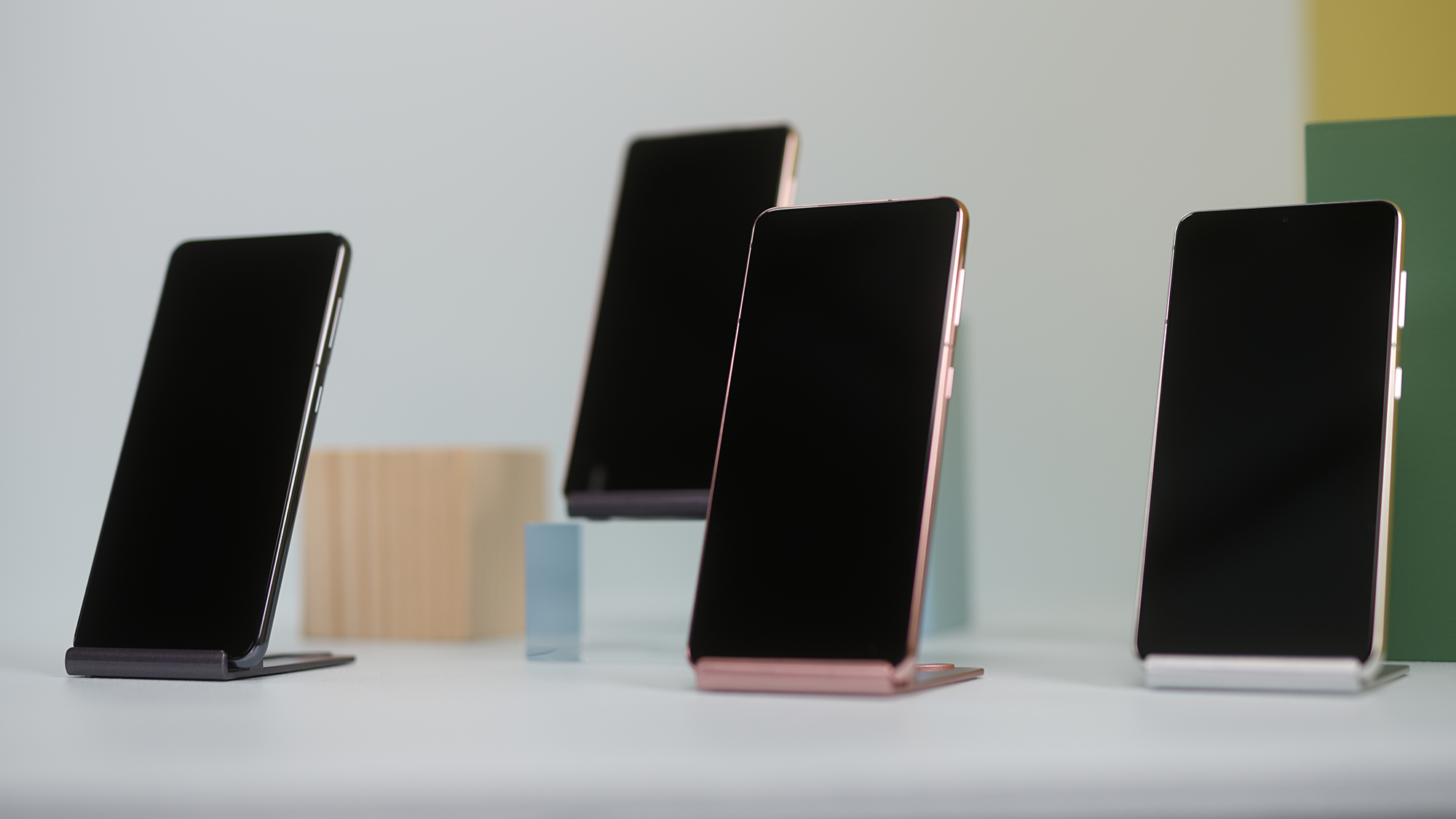
iPhone 12 vs. Galaxy S21: display
With the displays powered off, these devices are within spitting range one another at 6.2-inches for the Galaxy S21 and 6.1-inches for the iPhone 12. The iPhone 12 has its prominent notch at the top-center while the Galaxy S21 uses the more subtle hole-punch camera.
Turning to the actual tech inside those displays, the iPhone 12 made the big move to a Super Retina XDR OLED this year with a 2532 x 1170-pixel display, a significant improvement on both counts from the iPhone 11. The Galaxy S21, on the other hand, saw a decrease in resolution to FHD+ (2400x1080) for its Dynamic AMOLED 2X.
In real-world usage, that resolution difference is negligible and we have enough experience with this display tech from Samsung to confidently say it's the superior panel overall.
While it would be somewhat close based on the specs above, the Galaxy S21 has another card to play with its 120Hz adaptive refresh rate. That's a nice upgrade from the static 120Hz from last year. Now you can enjoy the smoother look and feel of a high refresh rate without the battery implications as the display will drop to 48Hz for more static content.
Apple made up some ground this year to be sure, but Samsung remains dominant when it comes to smartphone displays.
Winner: Galaxy S21
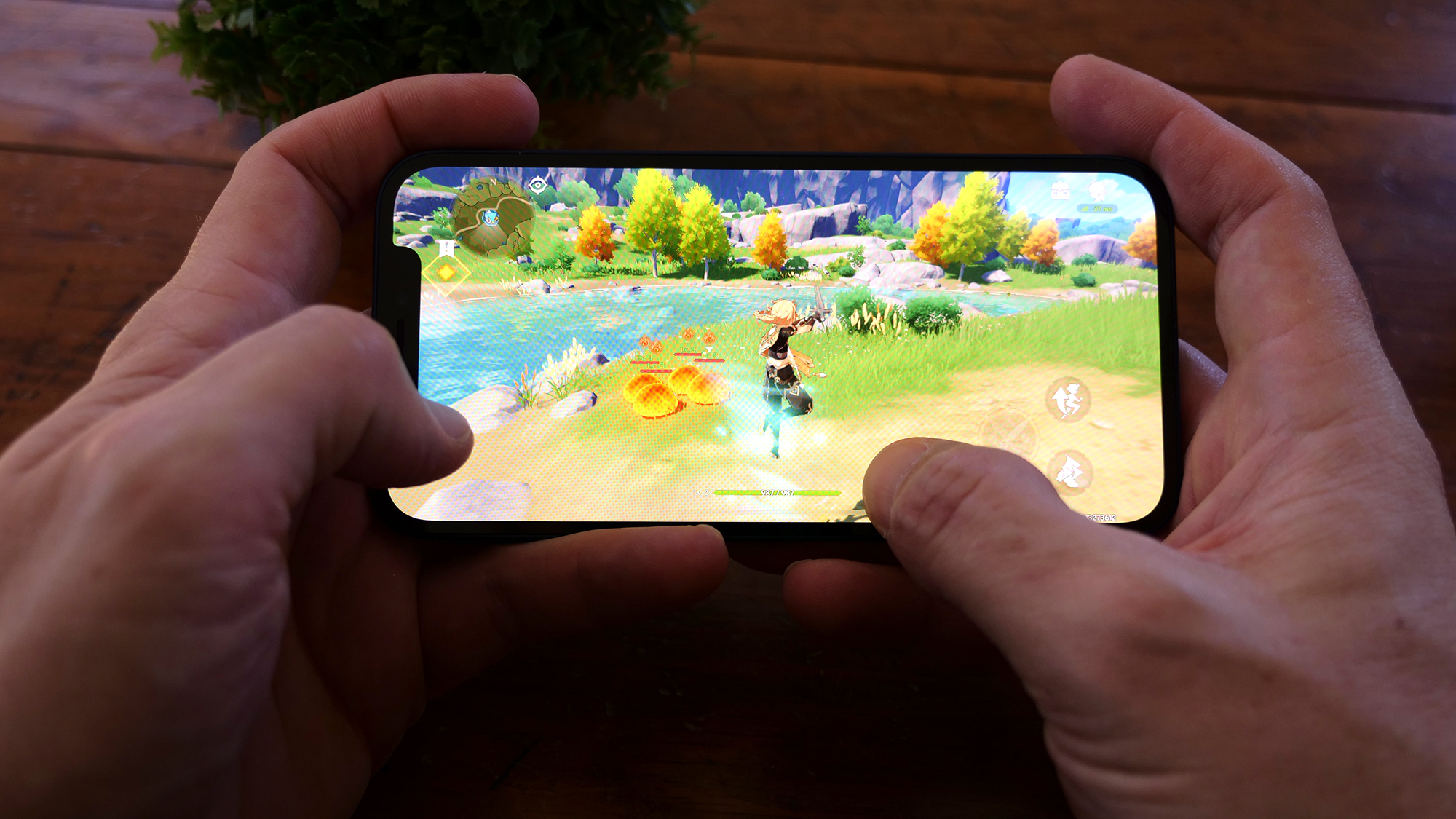
iPhone 12 vs. Galaxy S21: performance
The A14 Bionic chip in the iPhone 12 is quite simply the most powerful mobile chipset on the planet, so outside of another iPhone 12 model, it won't lose to anything in this category.
The Galaxy S21, by comparison, has the newly released Snapdragon 888. It offers a number of advantages over last year's Snapdragon 865, including a 20% increase in CPU performance, a 25% boost to graphics, and double the AI processing speed. That's all well and good, and will no doubt be capable of running any game or app that you can find in the Google Play store flawlessly, but it's no match for the A14 Bionic.
Winner: iPhone 12
iPhone 12 vs. Galaxy S21: battery life and charging
We still need to put the Galaxy S21 through our Laptop Mag battery test (which involves continuous web surfing at 150 nits of brightness), but it won't be a herculean task for it to take down the iPhone 12, which lasted just 8 hours and 24 minutes. The Galaxy S21 has a considerably larger battery, at 4,000mAh, compared to 2,775mAh for the iPhone 12. While the latter traditionally has managed to do more with less, that's a lot to overcome.
If you are willing to disable 5G on the iPhone 12 you can get a nice increase, up to 10 hours and 23 minutes in our testing on 4G. However, as 5G becomes increasingly relevant in the years ahead, that's a trade-off not everyone is going to want to make.
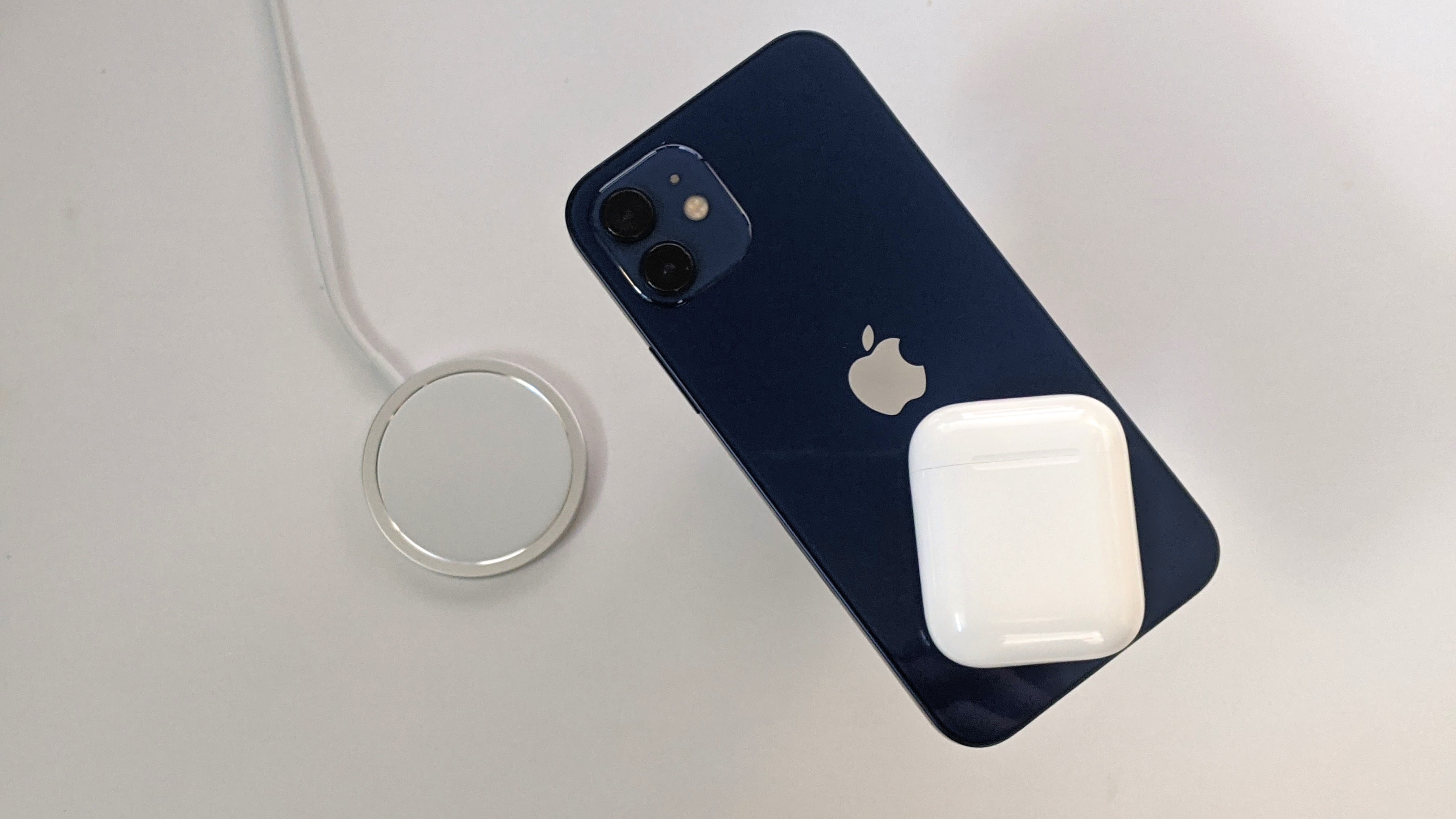
Both smartphones support wireless charging with Qi-compatible chargers and fast wired charging at up to 20W for the iPhone 12 and 25W for the Galaxy S21. The iPhone 12 also offers MagSafe charging, which is a combination of Qi and a circular magnet on the back of the phone.
I strongly suspect the Galaxy S21 will come out ahead on battery life in the end, and it does enjoy a slight advantage when it comes to charging, but I'm deeming this a draw until we have our official results.
Winner: Draw
iPhone 12 vs. Galaxy S21: cameras
The iPhone 12 features three 12-megapixel cameras: a primary wide-angle with an f/1.6 aperture, an ultra-wide lens with an f/2.4 aperture, and the front-facing TrueDepth camera with an f/2.2 aperture. The Galaxy S21 adds one more camera to the mix with a 12MP (f/1.8) primary wide-angle lens, a 12MP (f/2.2) ultra-wide lens, a 64MP telephoto (ƒ/2.2) and a 10MP (f/2.4) front-facing camera.
Each phone has one stand-out spec here with the iPhone 12's f/1.6 primary lens being one of the fastest mobile lenses on the market and the Galaxy S21 delivering powerful reach with its 64MP telephoto lens. Given its trio of lenses, the Galaxy S21 is the more versatile of the two phones when it comes to photography.
However, as the Pixel has taught us over the last few years, hardware is only part of the story when it comes to mobile photography. Computational photography can completely transform photos from less-than-stellar hardware. Apple really upped its game in this regard this year and we are waiting to see if the same is true for Samsung with the Galaxy S21.
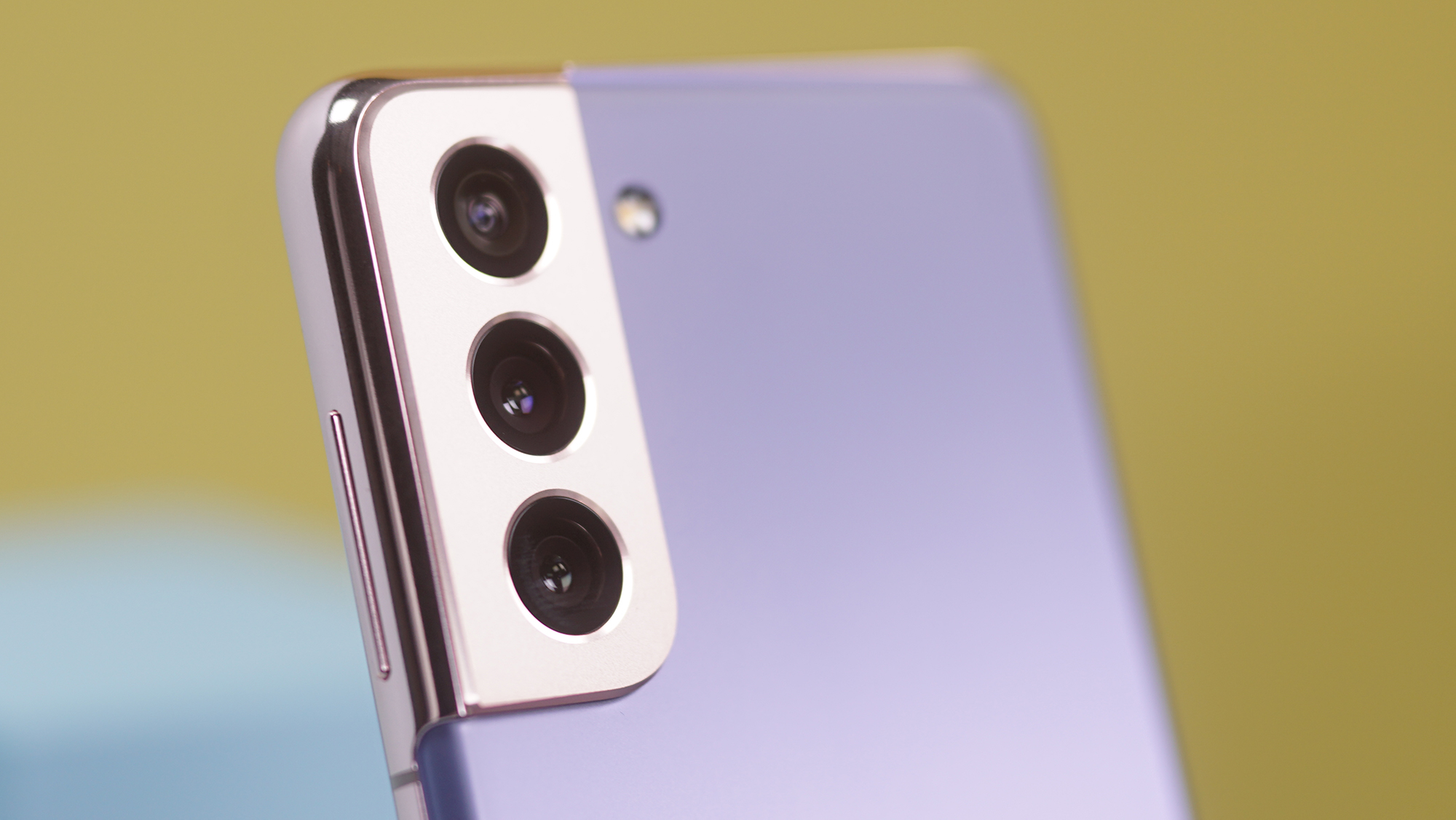
The Snapdragon 888 SoC in the Galaxy S21 added a number of new features that should help improve camera performance for Samsung, and it's clear the company is aware of the need to address this gap. There were numerous references to AI-powered photography at the Galaxy S21 announcement.
One area that is unlikely to tip in Samsung's favor is selfies; the TrueDepth front-facing camera on the iPhone 12 has the more sophisticated tech to determine distance and will almost certainly produce better photos, particularly portrait style shots.
While I do like having the reach that a telephoto lens offers, I'm granting the preliminary win in this category to the iPhone 12 as a known quantity. Samsung is saying the right things about its computational photography with the Galaxy S21, but I'll believe it when I see it.
Winner: iPhone 12
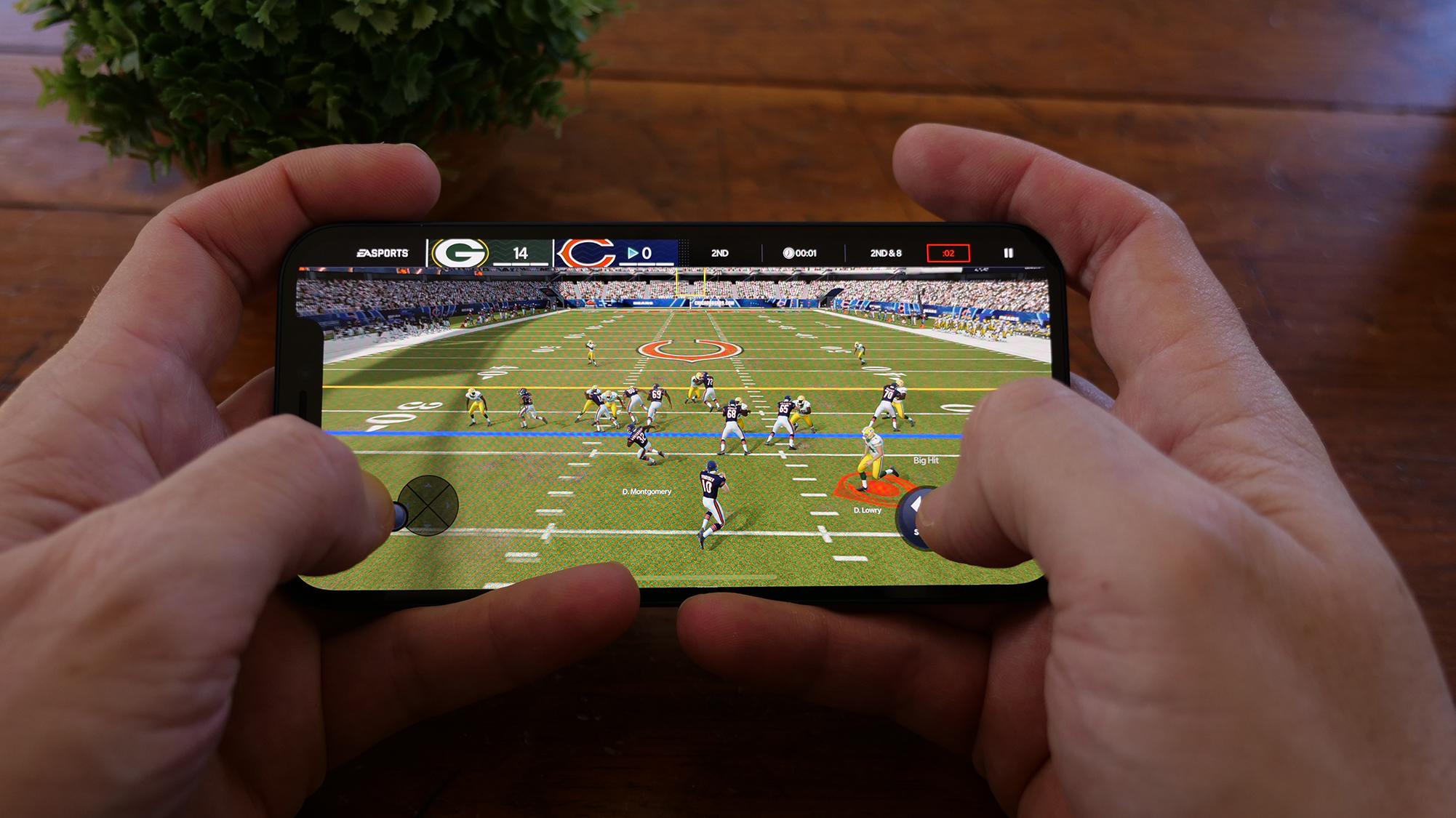
iPhone 12 vs. Galaxy S21: software
As always, there will be no iOS vs. Android wars here. I use them enough that I feel quite confident in saying they both have their plusses and minuses. Each operating system has borrowed liberally from the other and any perceived advantages are almost invariably just a question of familiarity.
With that said, I will grant one clear advantage to the iPhone 12: software upgrades. The iPhone 12 will continue to receive the latest and greatest iOS updates for at least 5 to 7 years. Samsung took a positive step last year by committing to three generations of Android OS updates, but that means roughly three years of updates, which typically lag by at least a few months from the release of the new OS.
Software updates aren't everything; Google tries to offload a lot onto apps, including Play Services, so you see plenty of other updates beyond the core OS updates. Still, there's no denying this is an advantage for iPhone owners.
The only other software consideration is app availability and while it isn't as one-sided as it was even just a few years ago, there are still some apps that either don't come to Android or have a superior experience on iOS. If any of these are must-haves for you, then this should weigh heavily in your decision.
Winner: iPhone 12
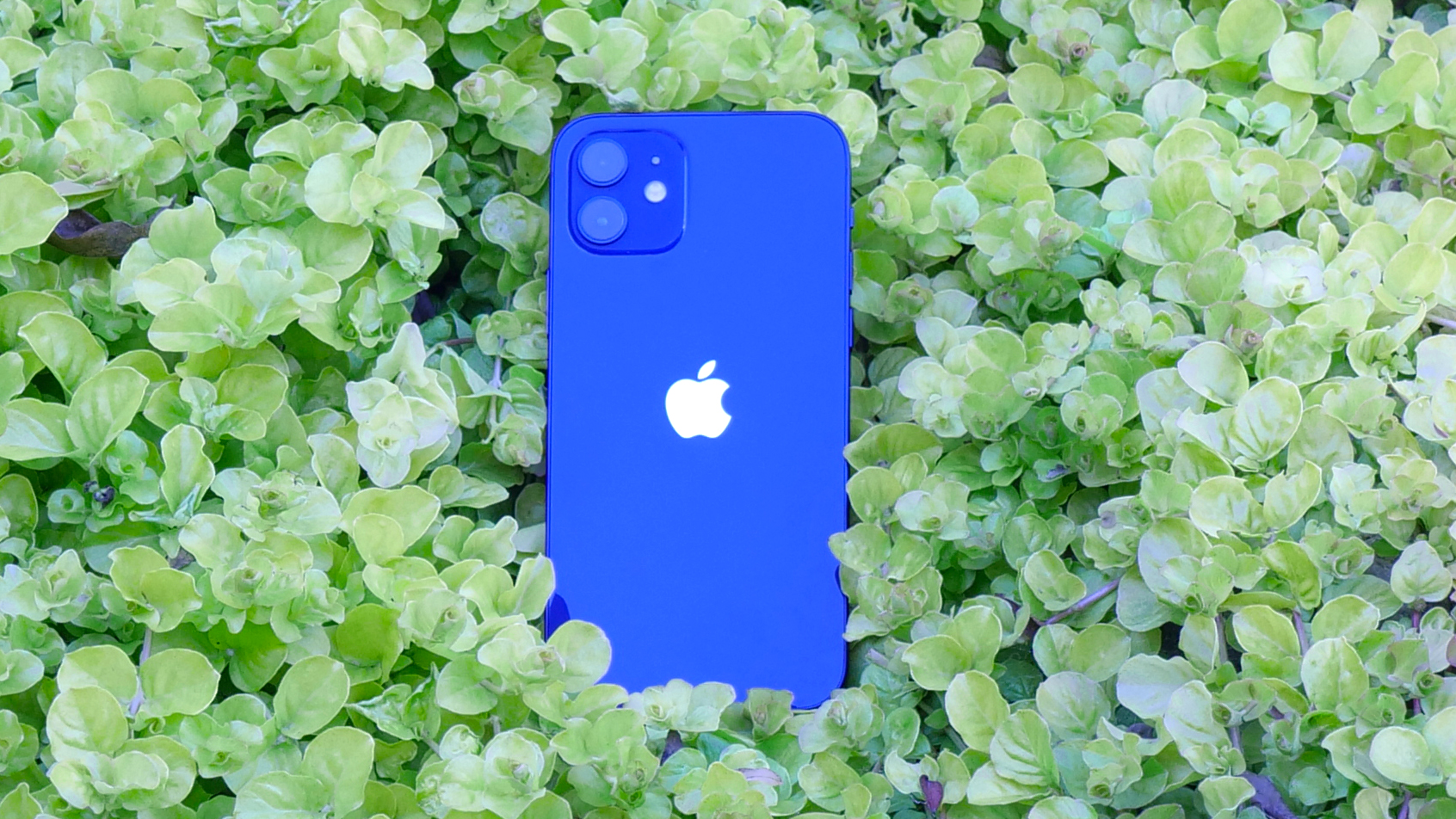
Overall winner: iPhone 12
I like a lot of what Samsung has done with the Galaxy S21. With its new price point, it is a far more compelling device than the Galaxy S20 was last year despite just a few key spec changes. However, at least at present, the iPhone 12 is the overall winner of this face-off.
The iPhone 12 has a few advantages that are going to make it a better option for most buyers. One is longevity; if you only buy a new phone every three to five years, the iPhone 12 will still be running the latest version of iOS smoothly thanks to its ridiculous A14 Bionic chip. The iPhone 12 also delivers excellent camera performance that should only improve over time as it further refines its computational photography algorithms. Finally, it retains its value better when you do decide to trade it in and upgrade again.
That isn't to count out the Galaxy S21 completely. Factoring in the specs, including the all-important storage, you are getting more for either the same or less when compared to the iPhone 12. It may not be up to A14 Bionic levels, but performance won't be a problem anytime soon for the Galaxy S21, and it will receive roughly three years of software updates, at which point, many users are ready for an upgrade anyway. The Galaxy S21 may be able to turn this around once we complete our full review, but for now, the iPhone 12 retains its crown.
Sean Riley has been covering tech professionally for over a decade now. Most of that time was as a freelancer covering varied topics including phones, wearables, tablets, smart home devices, laptops, AR, VR, mobile payments, fintech, and more. Sean is the resident mobile expert at Laptop Mag, specializing in phones and wearables, you'll find plenty of news, reviews, how-to, and opinion pieces on these subjects from him here. But Laptop Mag has also proven a perfect fit for that broad range of interests with reviews and news on the latest laptops, VR games, and computer accessories along with coverage on everything from NFTs to cybersecurity and more.

